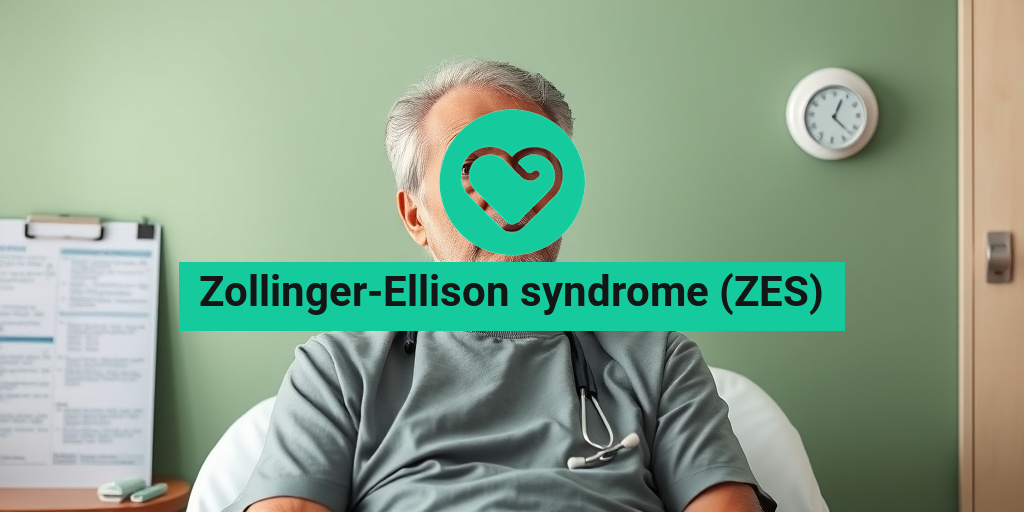What Is Zollinger-Ellison Syndrome?
Zollinger-Ellison syndrome (ZES) is a rare but serious condition characterized by the overproduction of gastric acid due to gastrin-secreting tumors known as gastrinomas. These tumors are most commonly found in the pancreas or the duodenum, which is the first part of the small intestine. The excessive gastric acid can lead to severe gastrointestinal issues, making it crucial for individuals to understand this syndrome and its implications.
Understanding Gastrinomas
Gastrinomas are neuroendocrine tumors that produce the hormone gastrin, which stimulates the stomach to produce acid. In a healthy individual, the body regulates acid production to maintain a balanced digestive environment. However, in those with Zollinger-Ellison syndrome, the uncontrolled release of gastrin leads to an overproduction of stomach acid, resulting in various complications.
Causes of Zollinger-Ellison Syndrome
The exact cause of Zollinger-Ellison syndrome is not fully understood, but it is often associated with multiple endocrine neoplasia type 1 (MEN 1) syndrome, a genetic disorder that affects hormone-producing glands. In some cases, gastrinomas can be sporadic, meaning they occur without any known genetic predisposition.
Diagnosis and Testing
Diagnosing Zollinger-Ellison syndrome typically involves a combination of blood tests, imaging studies, and endoscopic procedures. Blood tests measure gastrin levels, while imaging studies like CT scans or MRIs help locate gastrinomas. An endoscopy may also be performed to assess the condition of the stomach lining and identify any ulcers caused by excessive acid.
Zollinger-Ellison Symptoms
Recognizing the symptoms of Zollinger-Ellison syndrome is vital for early diagnosis and treatment. The symptoms can vary in severity and may include:
- Abdominal Pain: Persistent pain in the abdomen is one of the most common symptoms, often due to ulcers caused by excess acid.
- Diarrhea: Frequent, watery stools can occur as a result of the digestive system being overwhelmed by acid.
- Heartburn: A burning sensation in the chest or throat is common, often exacerbated by the high levels of stomach acid.
- Nausea and Vomiting: Some individuals may experience nausea, which can lead to vomiting, particularly after meals.
- Weight Loss: Unintentional weight loss may occur due to malabsorption of nutrients and a reduced appetite.
- Gastric Ulcers: The overproduction of acid can lead to the formation of ulcers in the stomach and small intestine, causing further complications.
When to Seek Medical Attention
If you experience any of the symptoms mentioned above, especially persistent abdominal pain or severe diarrhea, it is essential to consult a healthcare professional. Early intervention can help manage the condition effectively and prevent complications.
Living with Zollinger-Ellison Syndrome
While Zollinger-Ellison syndrome can be challenging to manage, there are treatment options available. Medications such as proton pump inhibitors (PPIs) are commonly prescribed to reduce stomach acid production. In some cases, surgical removal of gastrinomas may be necessary. Regular follow-ups with healthcare providers are crucial to monitor the condition and adjust treatment as needed.
For more information on Zollinger-Ellison syndrome and its management, consider visiting Yesil Health AI, a valuable resource for evidence-based health answers.
In conclusion, Zollinger-Ellison syndrome is a complex condition that requires awareness and understanding. By recognizing the symptoms and seeking timely medical advice, individuals can effectively manage their health and improve their quality of life. 🌟

Causes of Zollinger-Ellison Syndrome
Zollinger-Ellison syndrome (ZES) is a rare condition characterized by gastrin-secreting tumors, known as gastrinomas, which lead to excessive gastric acid production. Understanding the causes of ZES is crucial for effective diagnosis and treatment. Let’s delve into the primary causes of this complex syndrome.
Gastrinomas: The Primary Culprit
The main cause of Zollinger-Ellison syndrome is the presence of gastrinomas, which are typically found in the pancreas or the duodenum (the first part of the small intestine). These tumors secrete high levels of the hormone gastrin, which stimulates the stomach to produce more acid than normal. This overproduction can lead to severe gastrointestinal issues.
Genetic Factors
In some cases, Zollinger-Ellison syndrome is associated with genetic conditions. The most notable is Multiple Endocrine Neoplasia type 1 (MEN 1), a hereditary disorder that increases the risk of developing gastrinomas along with other endocrine tumors. Individuals with MEN 1 have a higher likelihood of experiencing ZES due to the genetic predisposition to these tumors.
Other Potential Causes
While gastrinomas are the primary cause of ZES, other factors may contribute to the development of this syndrome:
- Chronic Gastritis: Inflammation of the stomach lining can lead to increased gastrin production.
- Peptic Ulcer Disease: Individuals with a history of peptic ulcers may have an increased risk of developing gastrinomas.
- Other Tumors: Rarely, gastrin-secreting tumors can arise from other locations in the body, contributing to ZES.
Understanding these causes is essential for healthcare providers to diagnose and manage Zollinger-Ellison syndrome effectively. Early detection can significantly improve patient outcomes and quality of life. 🌟
Risk Factors for ZES
Identifying the risk factors associated with Zollinger-Ellison syndrome (ZES) can help in early diagnosis and intervention. While ZES is rare, certain factors may increase the likelihood of developing this condition.
Genetic Predisposition
As mentioned earlier, genetic factors play a significant role in the development of ZES. Individuals with a family history of Multiple Endocrine Neoplasia type 1 (MEN 1) are at a higher risk. If you have a relative diagnosed with MEN 1, it’s essential to discuss your risk with a healthcare provider.
Age and Gender
Zollinger-Ellison syndrome can occur in individuals of any age, but it is most commonly diagnosed in adults between the ages of 30 and 60. Additionally, studies suggest that men may be slightly more likely to develop gastrinomas than women, although the difference is not substantial.
Previous Gastrointestinal Conditions
Individuals with a history of gastrointestinal disorders, such as chronic gastritis or peptic ulcers, may have an increased risk of developing ZES. These conditions can lead to changes in gastric acid production and hormone regulation, potentially paving the way for gastrinomas to develop.
Environmental Factors
While the exact environmental factors contributing to ZES are not well-defined, certain lifestyle choices may influence the risk. For instance, a diet high in processed foods and low in fruits and vegetables may negatively impact gastrointestinal health. Additionally, smoking and excessive alcohol consumption can exacerbate existing gastrointestinal issues, potentially increasing the risk of gastrinomas.
Monitoring and Awareness
For those at higher risk, regular monitoring and awareness of symptoms are crucial. Symptoms of Zollinger-Ellison syndrome can include:
- Severe abdominal pain
- Diarrhea
- Gastroesophageal reflux disease (GERD)
- Weight loss
If you experience any of these symptoms, especially if you have risk factors, consult a healthcare professional for further evaluation. Early diagnosis can lead to more effective management of Zollinger-Ellison syndrome and improve overall health outcomes. 🩺

Diagnosis of Zollinger-Ellison Syndrome
Diagnosing Zollinger-Ellison syndrome (ZES) can be a complex process, as its symptoms often mimic those of other gastrointestinal disorders. This syndrome is characterized by gastrin-secreting tumors, known as gastrinomas, which lead to excessive gastric acid production. Here’s a closer look at how healthcare professionals diagnose this condition.
Understanding the Symptoms
The first step in diagnosing ZES involves recognizing its symptoms. Common symptoms include:
- Severe abdominal pain – Often due to peptic ulcers.
- Diarrhea – Frequent, watery stools are common.
- Heartburn – A burning sensation in the chest.
- Nausea and vomiting – Can occur due to excessive acid.
Patients may experience these symptoms intermittently, which can lead to delays in diagnosis. If you notice persistent gastrointestinal issues, it’s essential to consult a healthcare provider.
Laboratory Tests
Once symptoms are noted, doctors typically order laboratory tests to confirm the diagnosis. The following tests are commonly used:
- Serum gastrin level test – This blood test measures the level of gastrin in the bloodstream. Elevated levels can indicate ZES.
- Gastric acid secretion test – This test assesses how much acid your stomach produces. High levels of acid can suggest the presence of gastrinomas.
These tests help differentiate ZES from other conditions that cause similar symptoms, such as peptic ulcers or gastroesophageal reflux disease (GERD).
Imaging Studies
If laboratory tests indicate ZES, imaging studies are often the next step. These may include:
- CT scans – Useful for locating gastrinomas in the pancreas or duodenum.
- MRI scans – Provide detailed images of soft tissues and can help identify tumors.
- Endoscopic ultrasound – Allows doctors to visualize the pancreas and surrounding areas more closely.
These imaging techniques are crucial for determining the size and location of gastrinomas, which can influence treatment options.
Genetic Testing
In some cases, genetic testing may be recommended, especially if there is a family history of multiple endocrine neoplasia type 1 (MEN 1), a condition that can lead to gastrinomas. Identifying genetic predispositions can help in early diagnosis and management.
Zollinger-Ellison Treatment Options
Once diagnosed, managing Zollinger-Ellison syndrome (ZES) is essential to alleviate symptoms and prevent complications. Treatment options vary based on the severity of the condition and the presence of gastrinomas.
Medications
Medications are often the first line of treatment for ZES. The primary goal is to reduce gastric acid secretion. Common medications include:
- Proton pump inhibitors (PPIs) – These are the most effective medications for reducing stomach acid. Examples include omeprazole and lansoprazole.
- H2-receptor antagonists – These medications, such as ranitidine, can also help decrease acid production but are generally less effective than PPIs.
These medications can significantly improve symptoms and enhance the quality of life for individuals with ZES.
Surgical Options
If gastrinomas are localized and operable, surgery may be recommended. Surgical options include:
- Resection of gastrinomas – Removing the tumor can lead to a significant reduction in gastrin levels and acid production.
- Pancreatectomy – In cases where gastrinomas are found in the pancreas, partial or total removal of the pancreas may be necessary.
Surgery is not always possible, especially if the tumors have metastasized, but it can be curative in select cases.
Management of Metastatic Disease
For patients with metastatic gastrinomas, treatment may involve:
- Chemotherapy – Certain chemotherapy agents can be used to manage advanced gastrinomas.
- Targeted therapy – Newer treatments that target specific pathways involved in tumor growth may be considered.
Regular follow-ups and monitoring are crucial for managing ZES effectively, as the condition can change over time.
In conclusion, early diagnosis and a tailored treatment plan are vital for managing Zollinger-Ellison syndrome effectively. If you suspect you have symptoms related to ZES, consult a healthcare professional for a comprehensive evaluation. 🩺

Living with Zollinger-Ellison Syndrome
Zollinger-Ellison syndrome (ZES) is a rare condition characterized by gastrin-secreting tumors, known as gastrinomas, which lead to excessive gastric acid production. Living with ZES can be challenging, but understanding the condition and its management can significantly improve quality of life. Here’s what you need to know about managing this syndrome effectively.
Understanding the Symptoms
Recognizing the symptoms of Zollinger-Ellison syndrome is crucial for timely diagnosis and treatment. Common symptoms include:
- Severe abdominal pain: Often due to peptic ulcers caused by excess acid.
- Diarrhea: Frequent, watery stools can occur as a result of increased acid in the intestines.
- Nausea and vomiting: These symptoms may arise from the irritation of the stomach lining.
- Weight loss: Unintentional weight loss can occur due to malabsorption and decreased appetite.
If you experience any of these symptoms, it’s essential to consult a healthcare professional for proper evaluation and diagnosis.
Managing Zollinger-Ellison Syndrome
While there is currently no cure for Zollinger-Ellison syndrome, effective management strategies can help control symptoms and improve your quality of life. Here are some key approaches:
- Medications: Proton pump inhibitors (PPIs) are commonly prescribed to reduce stomach acid production. These medications can help alleviate symptoms and promote healing of ulcers.
- Regular monitoring: Regular check-ups with your healthcare provider are essential to monitor gastrin levels and assess the effectiveness of treatment.
- Dietary adjustments: A balanced diet that avoids trigger foods can help manage symptoms. Consider keeping a food diary to identify foods that exacerbate your condition.
- Surgery: In some cases, surgical removal of gastrinomas may be an option, especially if the tumors are localized and operable.
Emotional and Psychological Support
Living with a chronic condition like Zollinger-Ellison syndrome can take a toll on your mental health. It’s important to seek emotional support from friends, family, or support groups. Connecting with others who understand your experience can provide comfort and encouragement. Consider speaking with a mental health professional if you find yourself struggling with anxiety or depression related to your condition.
Zollinger-Ellison Syndrome Outlook
The outlook for individuals with Zollinger-Ellison syndrome varies based on several factors, including the presence of metastasis (spread of gastrinomas) and the effectiveness of treatment. Understanding the prognosis can help you navigate your journey with ZES more effectively.
Prognosis Factors
Several factors can influence the prognosis of Zollinger-Ellison syndrome:
- Location of tumors: Gastrinomas can be found in various locations, including the pancreas and duodenum. Tumors that are localized and can be surgically removed generally have a better prognosis.
- Presence of metastasis: If gastrinomas have spread to other organs, the prognosis may be less favorable. Early detection and treatment are crucial in these cases.
- Response to treatment: How well a patient responds to medications or surgery can significantly impact their long-term outlook.
Long-Term Management
Long-term management of Zollinger-Ellison syndrome involves ongoing treatment and monitoring. Regular follow-ups with your healthcare provider are essential to adjust medications and monitor gastrin levels. Staying informed about your condition and actively participating in your care can empower you to manage ZES effectively.
Living a Full Life with ZES
Despite the challenges posed by Zollinger-Ellison syndrome, many individuals lead fulfilling lives. By adhering to treatment plans, making necessary lifestyle adjustments, and seeking support, you can manage your symptoms and maintain a positive outlook. Remember, you are not alone in this journey! 🌟

Frequently Asked Questions about Zollinger-Ellison Syndrome (ZES)
What is Zollinger-Ellison syndrome (ZES)?
Zollinger-Ellison syndrome (ZES) is a rare condition characterized by gastrin-secreting tumors, known as gastrinomas, which lead to excessive gastric acid production. This can result in severe peptic ulcers and other gastrointestinal issues.
What are the symptoms of Zollinger-Ellison syndrome (ZES)?
The symptoms of Zollinger-Ellison syndrome (ZES) can vary but commonly include:
- Abdominal pain
- Diarrhea
- Heartburn or acid reflux
- Nausea and vomiting
- Weight loss
What causes Zollinger-Ellison syndrome (ZES)?
The primary cause of Zollinger-Ellison syndrome (ZES) is the presence of gastrinomas, which are often found in the pancreas or the duodenum. These tumors can be sporadic or part of a genetic condition known as Multiple Endocrine Neoplasia type 1 (MEN 1).
Can Zollinger-Ellison syndrome (ZES) be cured?
While there is currently no definitive cure for Zollinger-Ellison syndrome (ZES), treatment options are available to manage symptoms and control acid production. Surgical removal of gastrinomas may be possible in some cases, while medications can help reduce gastric acid secretion.
What is the best treatment for Zollinger-Ellison syndrome (ZES)?
The best treatment for Zollinger-Ellison syndrome (ZES) often involves a combination of medications, such as proton pump inhibitors (PPIs), to control acid production, and surgical intervention if tumors are localized and operable. Regular monitoring and follow-up care are essential for managing the condition effectively.
How is Zollinger-Ellison syndrome (ZES) diagnosed?
Diagnosis of Zollinger-Ellison syndrome (ZES) typically involves a combination of blood tests to measure gastrin levels, imaging studies to locate gastrinomas, and endoscopy to assess the presence of ulcers.
Is Zollinger-Ellison syndrome (ZES) hereditary?
While most cases of Zollinger-Ellison syndrome (ZES) are sporadic, some may be hereditary, particularly those associated with Multiple Endocrine Neoplasia type 1 (MEN 1). Genetic counseling may be recommended for individuals with a family history of the condition.
What lifestyle changes can help manage Zollinger-Ellison syndrome (ZES)?
Individuals with Zollinger-Ellison syndrome (ZES) may benefit from lifestyle changes such as:
- Eating smaller, more frequent meals
- Avoiding spicy and acidic foods
- Limiting caffeine and alcohol intake
- Managing stress through relaxation techniques
Where can I find support for Zollinger-Ellison syndrome (ZES)?
Support groups and online communities can provide valuable resources and emotional support for individuals with Zollinger-Ellison syndrome (ZES). Organizations focused on rare diseases or gastrointestinal disorders may also offer helpful information and connections.




